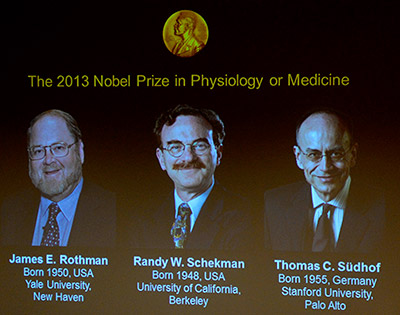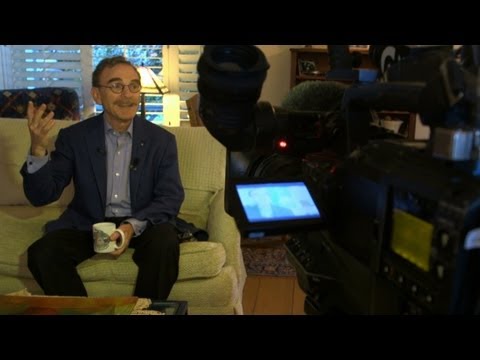Economic Reality: The 2013 Nobel Laureate ADMITS He Could NOT AFFORD College TODAY

If you’ve ever tried to communicate to someone from the baby boom generation that getting a college education today is a completely different ballgame than it was just a decade ago, let alone several decades ago, then this article will definitely help drive home the point that college used to LITERALLY cost pennies on the dollar compared to the suffocating burden of education prices today. It’s easy to say, “parents just don’t understand,” but I think they want to. Unfortunately, it’s something completely outside of their purview. When my parents went to college, they could pay for a FULL YEAR of higher education just by working a SUMMER job. By the time I reached their equivalent age and began attending college, I PAID for the equivalent of a house just to go to school, yet I don’t own a home. Instead, I own a piece of paper with my name on it, and the thought nearly sickens me.
Sadly, maybe it takes a Nobel Laureate to help communicate the economic disparity at stake and what it means to the future of America by asking 18 year olds to commit themselves to a life of indentured servitude by bargaining away their future to pay interest on student loans just to go to school, or essentially just to do something so basic that previous generations had unwittingly taken for granted.
The fact remains that students are getting price gouged just to get a degree that has very little value in the workplace, but that still serves as a minimum hiring standard just to earn a living wage. Sure everyone says to go to college. Unfortunately, the support just isn’t there. Have you applied for scholarships? I have. They aren’t worth the effort. Scholarships are more so for the donor to put their name on than for the recipient to draw any substantial amount of support from. The truth hurts, but the financial reality is that most scholarships are a misleading joke that barely pay the cost of a monthly meal plan. Books are now almost a third of the price of tuition. Tuition is worse than a mortgage payment. And why the heck doesn’t anyone ever talk about the price of living expenses while going to school? Are you living in a sewer? I sure as heck wasn’t. I was living in a cheap studio in a bad part of town with one window when I was going to school. No one could ever accuse me of living beyond my means. But wait. Thank God for loans, right? Wrong! That only doubles the long-term price of college.
Did your parents contribute to funding college for you? Mine didn’t. It doesn’t mean they didn’t care. I love them and I know they work hard. It just means that the price of tuition is so inflated that universities are making a killing on useless overhead by effectively leveraging their expenses and passing the risk of funding onto starry-eyed kids who aren’t even old enough to drink, but who will now owe student loans for the rest of their lives just so the college president can have nice drapes for his office library. Hindsight is 20/20. But I almost wish I never encouraged anyone to go to college because today it’s simply financially unfeasible. And yet, UN-educated hopefuls still pay for it only to become well-educated enough afterwards to realize that it wasn’t worth it.
I’m really glad that someone, anyone, particularly a Nobel Laureate is finally talking about the cold harsh reality of what is being sacrificed by allowing universities to rip off the next generation of Americans just so they can fund a new building that no one needs or wants. I’m glad someone it helping to bring the disturbing economic reality of the cost of higher education to the forefront of a national discussion.
Here’s a link to a noteworthy article recently published in MotherJones written by Chris Mooney and Indre Viskontas. Check the source citations below for the original references.
Peace.
Daniel 🙂

Could This 2013 Nobel Laureate Afford College Today? | Mother Jones.
Randy Schekman, one of this year’s Nobel Prize winners in medicine, says access to affordable, publicly supported higher education was crucial to his success. Can today’s scientific talent even afford to pursue a career like his?
When Randy Schekman attended the University of California-Los Angeles in the late 1960s, getting a good college education was unimaginably cheap. Student fees were just a few hundred dollars; room and board was a few hundred more. “I could work a summer job and pay myself for the whole school year,” says Schekman, now a cell biologist at the University of California-Berkeley.
On Monday, Schekman was awarded the Nobel Prize in medicine for his pioneering research on how cells transport proteins to other cells—a process fundamental to cellular communication.
Schekman’s college experience at UCLA, from which he graduated with a degree in molecular sciences in 1971, shifted him from wanting to pursue a career as a medical doctor to a fascination with scientific research. It was pivotal to his success—in science, the ultimate success. That’s why it’s so striking to hear Schekman say that as a Nobelist, he now wants to use his newfound influence to stand up for publicly funded higher education, which he considers to be “really in peril all over the country.”


